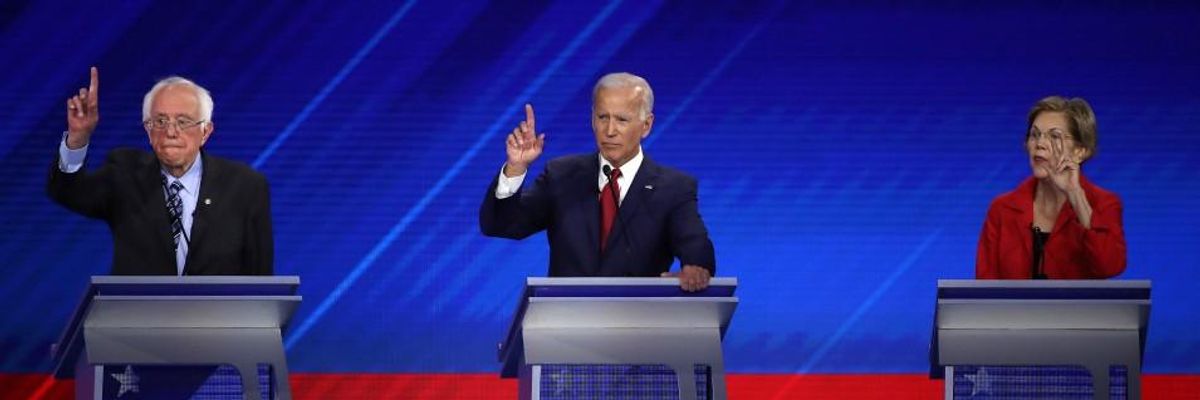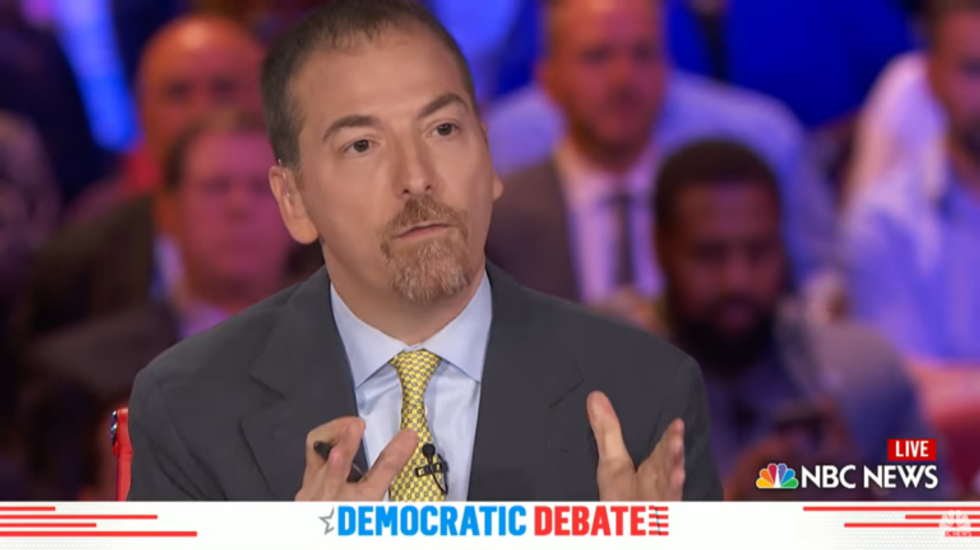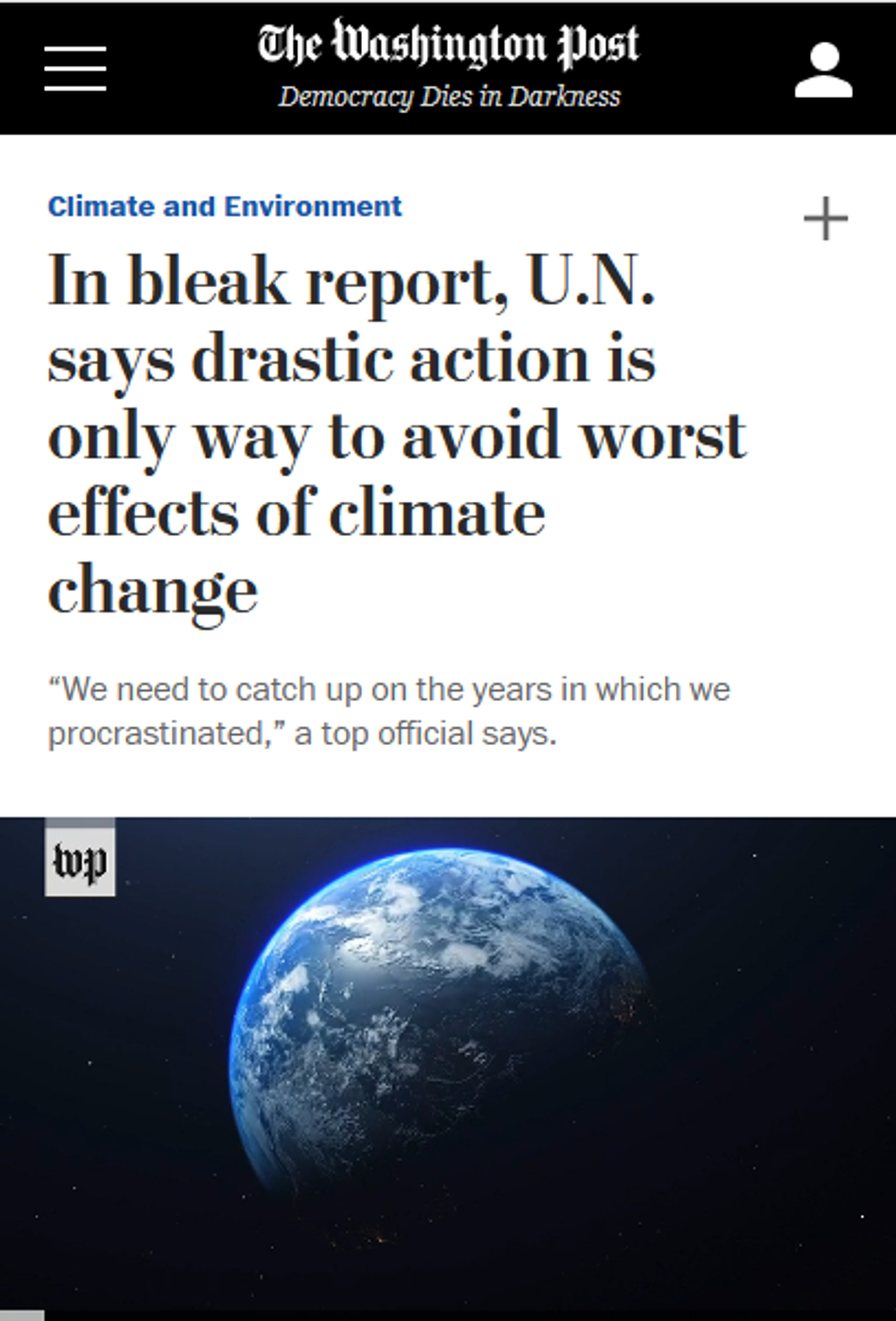

SUBSCRIBE TO OUR FREE NEWSLETTER
Daily news & progressive opinion—funded by the people, not the corporations—delivered straight to your inbox.
5
#000000
#FFFFFF
To donate by check, phone, or other method, see our More Ways to Give page.


Daily news & progressive opinion—funded by the people, not the corporations—delivered straight to your inbox.

Democratic presidential candidates Sen. Bernie Sanders (I-Vt.), former Vice President Joe Biden, and Sen. Elizabeth Warren (D-Mass.) raise their hands during the Democratic Presidential Debate at Texas Southern University's Health and PE Center on Sept. 12, 2019 in Houston, Texas. (Photo: Win McNamee/Getty Images)
As the Democratic Party prepared for its first presidential primary debates in June, climate activists pushed the DNC to schedule a single-issue debate on the climate crisis, given the urgency of the problem and the lack of attention given to it in previous debates. DNC chair Tom Perez refused, saying he had "the utmost confidence" that climate disruption would be discussed in the debates "early and often" (FAIR.org, 6/18/19).
Now that seven nights of debates have passed, and multiple media outlets have been given a chance to decide how early and often each issue is discussed, how accurate has Perez turned out to be? Pretty much dead wrong.
Across all the debates thus far, questions on the climate crisis have accounted for 7% of all questions, or 1 in every 14. (In raw numbers, it's 47 out of 638.) And last week's MSNBC debate was the first in which climate made it into the first hour of questioning--slipping in at the 59-minute mark. It has never been the lead question in a debate.

It's not just climate activists that want to hear the environment discussed in the debates--it's the public. Polls consistently show climate ranked among Democratic voters' top concerns, and one that they want to see discussed more in debates. The New York Times asked readers what they wanted to hear about both before and after the debate they co-hosted; climate topped the list both times. But during the debate, the Times hosts (and their CNN counterparts) didn't ask a single question about it (FAIR.org, 10/17/19).
FAIR's accounting counts hand-off prompts (such as, "Senator, your response?") as questions, since we're interested in who's being given the chance to speak on which topics. If you only count unique questions on climate, 20 have been asked across all debates.
Some have been useless, being too broad ("Explain specifically what your [climate proposal] is"--NBC's Chuck Todd, 6/27/19) or too convoluted ("Who pays for the mitigation to climate, whether it's building seawalls, for people that are perhaps living in places that they shouldn't be living? Is this a federal government issue that needs to do that. Do they have to move these people? What do you do about that, where maybe they're building a house someplace that is it safe? Who pays to build that house, and how much should the government be bailing them out?"--Todd again, 6/26/19). Many have focused on the idea that major climate action is not "realistic," or that it threatens people's freedoms to do things like drive gas-guzzling cars or eat meat.

Sen. Bernie Sanders (I-Vt.), who has pivoted hard toward the climate issue in recent weeks, has been given the most speaking prompts on climate--but not a single unique question. Sens. Elizabeth Warren (D-Mass.) and Cory Booker (D-N.J.), the only other candidates appearing in every debate who have received higher than a B+ grade from Greenpeace on their climate plans, have gotten one unique question each. Hand-off prompts, under the rules enforced by the media hosts, are generally limited to either 30 or 45 seconds, which means that the candidates with the most ambitious climate plans have been given criminally little time to explain them.
Perez may point in his defense to the climate town halls hosted by CNN (9/4/19) and MSNBC (9/19/19, 9/20/19), which did force candidates to speak in more detail about their plans--but, as we noted at the time, those forums get a fraction of the viewership and follow-up coverage that debates get (FAIR.org, 9/6/19). If anything, it seems the events gave media hosts a pass to minimize climate in subsequent debates, as CNN did in the debate they co-hosted after the town halls (FAIR.org, 10/17/19).
While media report on a "bleak" new U.N. report that finds, in the words of a Washington Post reporter (11/26/19), "rapid, unprecedented cuts in greenhouse gas emissions offer the only hope of averting an ever-intensifying cascade of consequences," you can't help but be struck by how blithely they undercut such reporting by minimizing the climate problem in the public forums that are expressly designed to help determine who might lead our country for the next four years.
Dear Common Dreams reader, The U.S. is on a fast track to authoritarianism like nothing I've ever seen. Meanwhile, corporate news outlets are utterly capitulating to Trump, twisting their coverage to avoid drawing his ire while lining up to stuff cash in his pockets. That's why I believe that Common Dreams is doing the best and most consequential reporting that we've ever done. Our small but mighty team is a progressive reporting powerhouse, covering the news every day that the corporate media never will. Our mission has always been simple: To inform. To inspire. And to ignite change for the common good. Now here's the key piece that I want all our readers to understand: None of this would be possible without your financial support. That's not just some fundraising cliche. It's the absolute and literal truth. We don't accept corporate advertising and never will. We don't have a paywall because we don't think people should be blocked from critical news based on their ability to pay. Everything we do is funded by the donations of readers like you. Will you donate now to help power the nonprofit, independent reporting of Common Dreams? Thank you for being a vital member of our community. Together, we can keep independent journalism alive when it’s needed most. - Craig Brown, Co-founder |
As the Democratic Party prepared for its first presidential primary debates in June, climate activists pushed the DNC to schedule a single-issue debate on the climate crisis, given the urgency of the problem and the lack of attention given to it in previous debates. DNC chair Tom Perez refused, saying he had "the utmost confidence" that climate disruption would be discussed in the debates "early and often" (FAIR.org, 6/18/19).
Now that seven nights of debates have passed, and multiple media outlets have been given a chance to decide how early and often each issue is discussed, how accurate has Perez turned out to be? Pretty much dead wrong.
Across all the debates thus far, questions on the climate crisis have accounted for 7% of all questions, or 1 in every 14. (In raw numbers, it's 47 out of 638.) And last week's MSNBC debate was the first in which climate made it into the first hour of questioning--slipping in at the 59-minute mark. It has never been the lead question in a debate.

It's not just climate activists that want to hear the environment discussed in the debates--it's the public. Polls consistently show climate ranked among Democratic voters' top concerns, and one that they want to see discussed more in debates. The New York Times asked readers what they wanted to hear about both before and after the debate they co-hosted; climate topped the list both times. But during the debate, the Times hosts (and their CNN counterparts) didn't ask a single question about it (FAIR.org, 10/17/19).
FAIR's accounting counts hand-off prompts (such as, "Senator, your response?") as questions, since we're interested in who's being given the chance to speak on which topics. If you only count unique questions on climate, 20 have been asked across all debates.
Some have been useless, being too broad ("Explain specifically what your [climate proposal] is"--NBC's Chuck Todd, 6/27/19) or too convoluted ("Who pays for the mitigation to climate, whether it's building seawalls, for people that are perhaps living in places that they shouldn't be living? Is this a federal government issue that needs to do that. Do they have to move these people? What do you do about that, where maybe they're building a house someplace that is it safe? Who pays to build that house, and how much should the government be bailing them out?"--Todd again, 6/26/19). Many have focused on the idea that major climate action is not "realistic," or that it threatens people's freedoms to do things like drive gas-guzzling cars or eat meat.

Sen. Bernie Sanders (I-Vt.), who has pivoted hard toward the climate issue in recent weeks, has been given the most speaking prompts on climate--but not a single unique question. Sens. Elizabeth Warren (D-Mass.) and Cory Booker (D-N.J.), the only other candidates appearing in every debate who have received higher than a B+ grade from Greenpeace on their climate plans, have gotten one unique question each. Hand-off prompts, under the rules enforced by the media hosts, are generally limited to either 30 or 45 seconds, which means that the candidates with the most ambitious climate plans have been given criminally little time to explain them.
Perez may point in his defense to the climate town halls hosted by CNN (9/4/19) and MSNBC (9/19/19, 9/20/19), which did force candidates to speak in more detail about their plans--but, as we noted at the time, those forums get a fraction of the viewership and follow-up coverage that debates get (FAIR.org, 9/6/19). If anything, it seems the events gave media hosts a pass to minimize climate in subsequent debates, as CNN did in the debate they co-hosted after the town halls (FAIR.org, 10/17/19).
While media report on a "bleak" new U.N. report that finds, in the words of a Washington Post reporter (11/26/19), "rapid, unprecedented cuts in greenhouse gas emissions offer the only hope of averting an ever-intensifying cascade of consequences," you can't help but be struck by how blithely they undercut such reporting by minimizing the climate problem in the public forums that are expressly designed to help determine who might lead our country for the next four years.
As the Democratic Party prepared for its first presidential primary debates in June, climate activists pushed the DNC to schedule a single-issue debate on the climate crisis, given the urgency of the problem and the lack of attention given to it in previous debates. DNC chair Tom Perez refused, saying he had "the utmost confidence" that climate disruption would be discussed in the debates "early and often" (FAIR.org, 6/18/19).
Now that seven nights of debates have passed, and multiple media outlets have been given a chance to decide how early and often each issue is discussed, how accurate has Perez turned out to be? Pretty much dead wrong.
Across all the debates thus far, questions on the climate crisis have accounted for 7% of all questions, or 1 in every 14. (In raw numbers, it's 47 out of 638.) And last week's MSNBC debate was the first in which climate made it into the first hour of questioning--slipping in at the 59-minute mark. It has never been the lead question in a debate.

It's not just climate activists that want to hear the environment discussed in the debates--it's the public. Polls consistently show climate ranked among Democratic voters' top concerns, and one that they want to see discussed more in debates. The New York Times asked readers what they wanted to hear about both before and after the debate they co-hosted; climate topped the list both times. But during the debate, the Times hosts (and their CNN counterparts) didn't ask a single question about it (FAIR.org, 10/17/19).
FAIR's accounting counts hand-off prompts (such as, "Senator, your response?") as questions, since we're interested in who's being given the chance to speak on which topics. If you only count unique questions on climate, 20 have been asked across all debates.
Some have been useless, being too broad ("Explain specifically what your [climate proposal] is"--NBC's Chuck Todd, 6/27/19) or too convoluted ("Who pays for the mitigation to climate, whether it's building seawalls, for people that are perhaps living in places that they shouldn't be living? Is this a federal government issue that needs to do that. Do they have to move these people? What do you do about that, where maybe they're building a house someplace that is it safe? Who pays to build that house, and how much should the government be bailing them out?"--Todd again, 6/26/19). Many have focused on the idea that major climate action is not "realistic," or that it threatens people's freedoms to do things like drive gas-guzzling cars or eat meat.

Sen. Bernie Sanders (I-Vt.), who has pivoted hard toward the climate issue in recent weeks, has been given the most speaking prompts on climate--but not a single unique question. Sens. Elizabeth Warren (D-Mass.) and Cory Booker (D-N.J.), the only other candidates appearing in every debate who have received higher than a B+ grade from Greenpeace on their climate plans, have gotten one unique question each. Hand-off prompts, under the rules enforced by the media hosts, are generally limited to either 30 or 45 seconds, which means that the candidates with the most ambitious climate plans have been given criminally little time to explain them.
Perez may point in his defense to the climate town halls hosted by CNN (9/4/19) and MSNBC (9/19/19, 9/20/19), which did force candidates to speak in more detail about their plans--but, as we noted at the time, those forums get a fraction of the viewership and follow-up coverage that debates get (FAIR.org, 9/6/19). If anything, it seems the events gave media hosts a pass to minimize climate in subsequent debates, as CNN did in the debate they co-hosted after the town halls (FAIR.org, 10/17/19).
While media report on a "bleak" new U.N. report that finds, in the words of a Washington Post reporter (11/26/19), "rapid, unprecedented cuts in greenhouse gas emissions offer the only hope of averting an ever-intensifying cascade of consequences," you can't help but be struck by how blithely they undercut such reporting by minimizing the climate problem in the public forums that are expressly designed to help determine who might lead our country for the next four years.